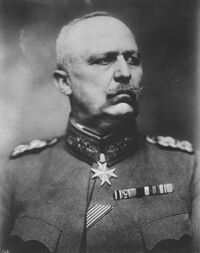| Erich Ludendorff | |
|---|---|

| |
| In office 1921–1928 | |
| Preceded by | Maximilian, Grand Duke of Baden |
| Succeeded by | Wilhelm Marx |
| Parliamentary Leader of the DNVP | |
| In office 1920–1929 | |
| Succeeded by | Alfred Hugenberg |
| First Quarter-Master General of the German Empire | |
| In office 1916–1919 | |
| Personal details | |
| Born | 9 April 1865 Kruszewnia, |
| Died | 20 December 1937 (aged 72) Munich, |
| Political party | DNVP |
Erich Friedrich Wilhelm Ludendorff (9 April 1865 – 20 December 1937) was a German military leader and later the 9th chancellor of the German Empire from 1921 to 1928. Upon his election after the Federal Election of 1921, which was seen as the first-free election, he became the first “popularly voted” chancellor.
From August 1916, his appointment as Quartermaster general (German: Erster Generalquartiermeister) made him the leader (along with Paul von Hindenburg) of the German war efforts during World War I. The success of Germany's great Spring Offensives in 1918 in its quest for total victory was his great strategic success, after which he gained a large personality cult from the adoring German public.
After the war, Ludendorff entered politics and became a prominent nationalist leader, taking control of the newly formed DNVP in 1920. In 1921, the SPD split into two factions, into a republican and a reformist wing. This, combined with Ludendorff’s massive popularity, led to a an unexpected DNVP victory in the federal elections.
His marriage to Mathilde von Kemnitz in 1925 led to him following conspiracies, such as the world's problems were the result of Christianity, especially the Jesuits and Catholics, but also conspiracies by Jews and the Freemasons. He detested Christianity and Judaism alike, and was a reported follower of the Nordic God Odin. His political opponents used this against him, and he started to become disliked by catholics, democrats and Jews. In the federal election of 1928, the “Democratic Alliance”, formed by Zentrum, the SPD, DVP and DDP won a majority and toppled Ludendorff’s government.
After the loss in elections, it was perceived that Ludendorff was no longer advantageous to the DNVP, and was later replaced by his protege, Alfred Hugenburg in 1929. Upon his ousting as party leader, he retired to Munich and wrote two ideological books. Das Effizienzproblem (The Efficiency Problem) was published in 1931, and underlined Ludendorff’s thoughts and opinions on the “undesirables” of society (Jews, Catholics, Jesuits, Socialists[1]). His second book, Der totale Krieg (The Total War), detailed his military and ideological theory of Total War. In this work, he argued that the entire physical and moral forces of the nation should be mobilized, because peace was merely an interval between wars.
Ludendorff died of liver cancer in the private clinic Josephinum in Munich, on 20 December 1937 at the age of 72. He was given a state funeral, which was attended by Wilhelm II and Alfred Hugenburg. Ludendorff remains a controversial figure in history, with some praising his role in the imperial victory, though his opinions on Christians and Jews remain criticised by all sides of the political and scholarly spectrum.
| |||||||||||||||||||||||
| ||||||||||||||||||||
- ↑ Das Effizienzproblem, pgs. 65,123 & 178.

